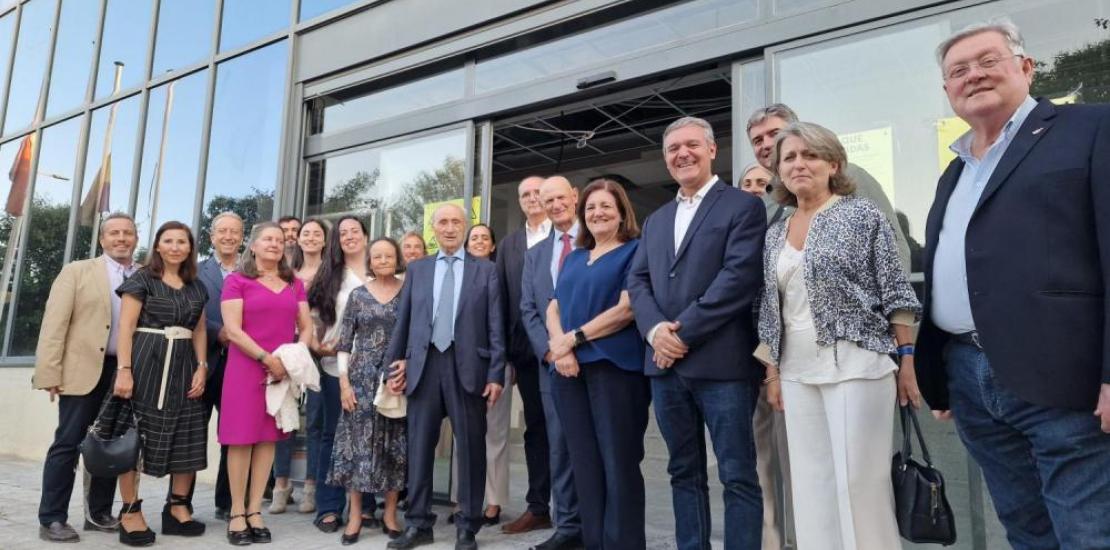Research will be a cornerstone of the UCAM Campus in Madrid
Scientist Juan Carlos Izpisúa and Doctor Pedro Guillén, two leading figures at the Catholic University of Murcia, visited the facilities, located in Torrejón de Ardoz, accompanied by the UCAM president, María Dolores García, along with other researchers, clinicians, directors and architects.
The brief stay in Spain of Juan Carlos Izpisúa, professor of Developmental Biology at UCAM and founding scientist and director of the San Diego Science Institute 'Altos Labs', has allowed for a tour of the UCAM Campus in Madrid. The facilities are currently being equipped so that it can open its doors next September, with the aim of starting the 2025-26 academic year with degrees in Nursing, Physiotherapy, Psychology, Food Science and Technology and Human Nutrition and Dietetics. Both he and Dr Pedro Guillén, honorary dean of Medicine at UCAM, director of its Chair of Sports Traumatology and president of the Clínica Cemtro, have welcomed the opening of UCAM in Madrid.
The UCAM president made reference to them saying that ‘they are two pillars of UCAM; they have always supported us in coming to Madrid and they will continue to do so here’, assuring that ‘together with teaching, research on this Campus will also be key’. For example, ‘with Juan Carlos Izpisúa in multiple sclerosis, while at the same time we want to resume, together with the support of the COE, his research to improve the recovery of injuries in athletes’. Meanwhile, ‘the Clínica Cemtro, chaired by Pedro Guillén, is a steadily growing institution, which is now going to be an even greater ally for us’.
During the visit, the prestigious Murcia orthopaedic surgeon Pedro Guillén confessed that ‘I am recalling José Luis Mendoza, because he would be overjoyed at this moment to show us all this, which is the work of a giant as was my friend, and we are going to contribute everything we can to turn it into what he dreamed of’. Regarding the teaching that will be provided, he pointed out that ‘there is a lack of health workers at all levels, nurses, assistants, physiotherapists and doctors, which will only increase. Therefore, this Campus, specialising in health, sport and nutrition, is going to be very good, and Torrejón has won the lottery’. Regarding the aforementioned collaboration, Tomás Fernández, head of Sports Medicine at Cemtro and deputy director of the Spanish School of Sports Traumatology at UCAM, said that ‘the Clínica Cemtro is a UCAM Campus in Madrid by agreement between José Luis Mendoza and Pedro Guillén. Together we have been teaching the Master’s Degree in Sports Traumatology for many years and we will do more things together, as UCAM is the University of Sport and at Cemtro, which is a FIFA centre of reference, we are specialised in sport. Therefore, it is a field that unites us’.
New advances in multiple sclerosis
The scientist Juan Carlos Izpisúa, after recalling that thanks to UCAM he has been able to develop exceptional projects such as the one on ageing, considered by the journal Cell as one of the research projects of the decade, commented on the advances being made with respect to multiple sclerosis, ‘a disease which in severe cases can be devastating for those who suffer from it and their families’.
Therefore, with the support of UCAM, ‘using IP cells, we have managed to obtain results in recent years on its progress and how to stop it in vitro, the next step being to transfer it to a preclinical animal, for which it is necessary to implant human cells in rodents and thus determine whether these advances that slow down the progression of the disease really work in vivo, for which we have already begun collaborations with several North American companies. This is a type of technology that we initiated with José Luis many years ago, and I am convinced that framing this research within this expansion in Madrid is very important‘, as is ‘strengthening the ties that UCAM already has with institutions such as Cemtro and the Hospital Clinic and extending them to other institutions', because 'research is fundamental to the work of the university, something that José Luis, María Dolores and I have always agreed on’.




